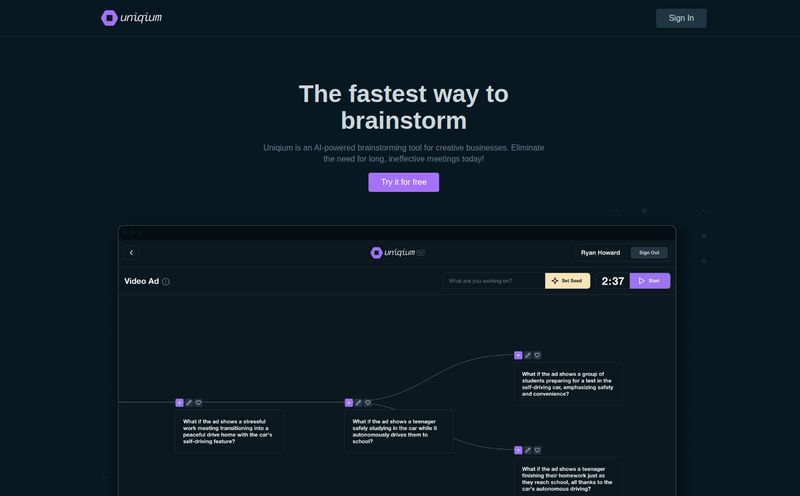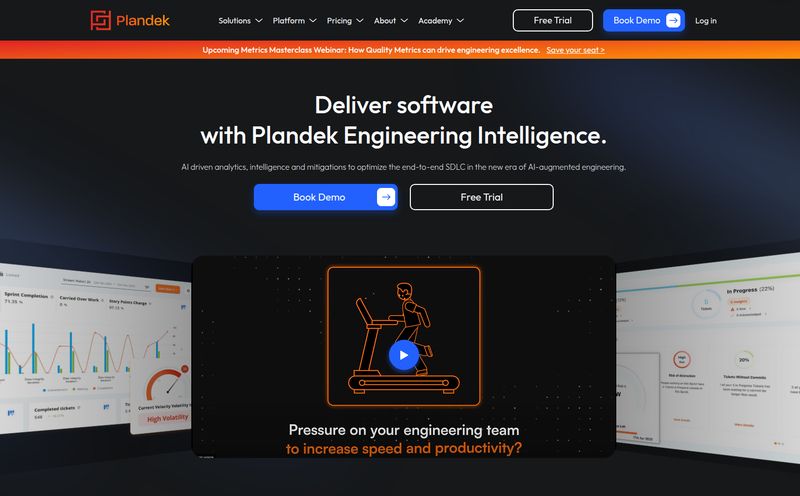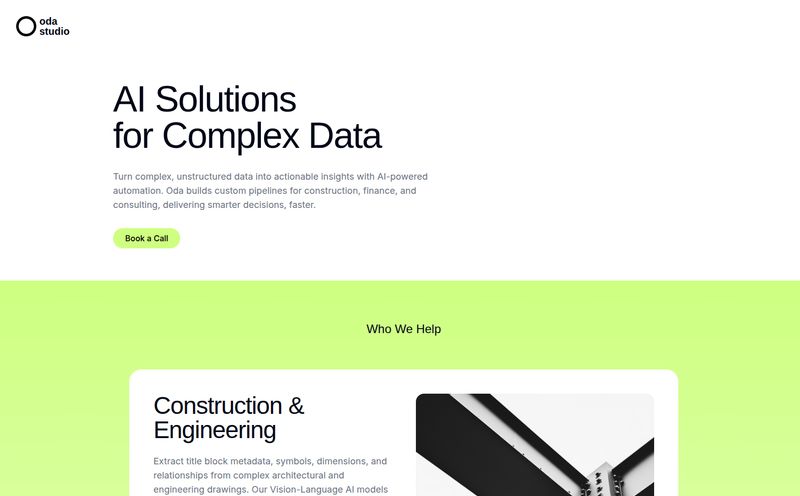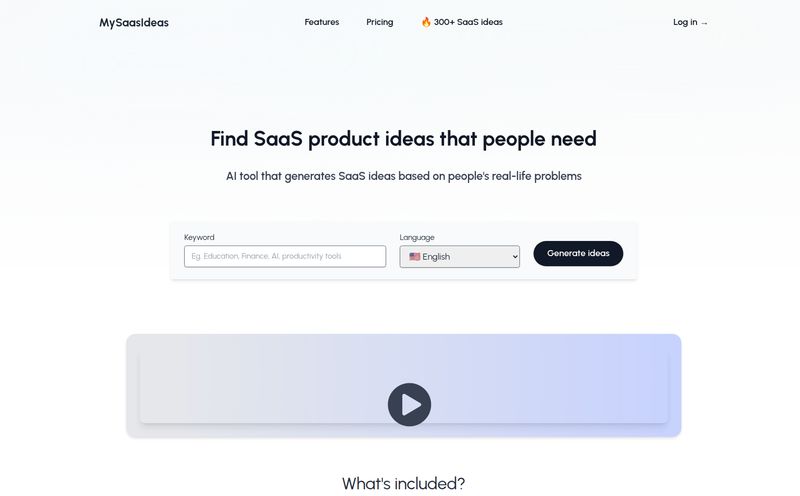As an SEO, a founder, or just someone chronically online, you’re probably drowning in “the next big thing.” Every day, there’s a new AI tool that promises to write your content, a new framework to build your app, a new marketing channel to master. It’s exhausting. And a lot of it is just noise.
The real signal, the one that truly matters, is where the money is going. Not just clicks, not just traffic, but cold, hard cash. For years, I’ve tried to reverse-engineer this. I'd see a small SaaS product blow up on Twitter and scramble through Ahrefs and Similarweb, trying to figure out how and when it started taking off. It’s a messy, imperfect science. It often felt like I was showing up to the party just as the lights were coming on.
So, when I stumbled upon a tool called WhoMakeMoney AI, my professional skepticism immediately kicked in. Another trend-spotting tool? Yawn. But then I looked closer. It wasn't tracking vanity metrics. It was tracking payment gateway traffic. Now that got my attention. It’s a bit like ignoring the crowd outside the club and instead listening for the cha-ching of the cash register inside. A far more reliable indicator of a good time, don't you think?
So, What Exactly is WhoMakeMoney AI?
This isn't your garden-variety SEO platform. Don't log in expecting a keyword research tool or a backlink checker. WhoMakeMoney AI does one thing, and it aims to do it exceptionally well: it monitors inbound traffic to payment platforms. We’re talking about the big ones—Stripe, Paddle, PayPal, Square, and a dozen others.
Think about it. When a new SaaS, digital product, or service starts getting traction, one of the first things that spikes isn't necessarily its organic search traffic. It’s the traffic hitting its checkout page. By watching these gateways, the platform gives you a peek at what people are actually paying for, often before it becomes a mainstream trend. It’s a lead indicator, not a lagging one. A pretty clever approach, if you ask me.
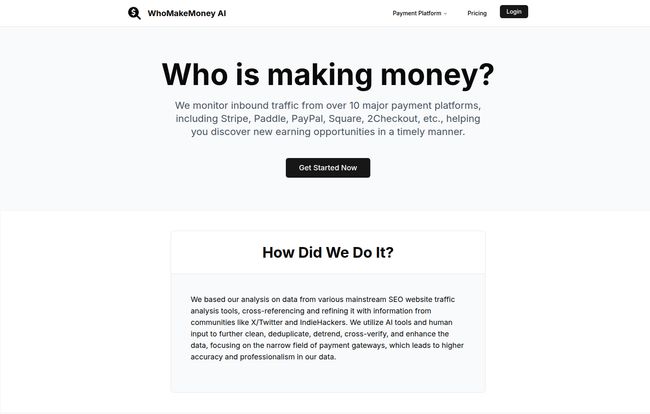
Visit WhoMakeMoney
The Secret Sauce: How They Do It
Okay, so the concept is cool. But data is only as good as its source. My first question was, “Where are you getting this data, and why should I trust it?” The folks behind WhoMakeMoney seem to have anticipated this, and their methodology is refreshingly transparent.
It’s More Than Just One Data Point
It starts with data from various mainstream SEO website traffic analysis tools. The usual suspects. But they acknowledge that this data can be... finicky. So they don't stop there. They treat it as a starting hypothesis, not the final word.
The Social and Human Layer
This is the part that I think is brilliant. They cross-reference the raw traffic data with what’s happening in the trenches—in communities like X/Twitter and IndieHackers. This adds the 'why' to the 'what'. You see a spike in traffic to a new design tool's Paddle checkout, and then you see the founder's "build in public" thread going viral on X. That’s not just data; that’s a story. That’s actionable intelligence.
And here's the kicker: they use both AI and human cross-validation. AI cleans and sorts the massive amounts of data, but a real person gives it the final once-over. In an age of endless AI-generated slop, knowing a human brain has vetted the information is a massive trust signal. It’s the difference between a robot handing you a list of numbers and a seasoned analyst telling you which numbers actually matter.
The Good Stuff: What I Actually Liked
I’ve been playing around with it, and a few things definately stand out.
- Focused Accuracy: By narrowing its focus to only payment gateways, the signal-to-noise ratio is fantastic. Other tools try to be a Swiss Army Knife and end up being a mediocre version of everything. This tool is more like a scalpel, designed for a specific, important surgery: finding revenue-generating projects.
- Timely Alerts: You can get notified when a new opportunity pops up. This is critical. The value in this kind of data decays quickly. Getting an email about a site that started blowing up yesterday is infinitely more valuable than reading about it in a newsletter next month.
- The Price, Man, The Price!: I’ll get into the specifics in a moment, but my Ahrefs bill makes my eyes water every month. The pricing for WhoMakeMoney is, frankly, a steal for the kind of specialized data it provides. It feels accessible to the indie hacker and solopreneur, not just big agencies with deep pockets.
A Look at the Pricing Tiers
Let's talk money. Their pricing model is straightforward and, in my opinion, very well-structured for their target audience.
| Plan | Cost | Best For |
|---|---|---|
| Free | $0 /month | The curious individual. You can view up to 50 websites and get a feel for the platform. Perfect for dipping your toes in without any commitment. |
| Pro | $9 /month ($108/year) | The sweet spot. For serious indie makers, freelancers, and SEOs. You get unlimited websites, favorite features, and advanced analytics. This is the one I'd recommend for most people. |
| Max | $14 /month ($168/year) | Power users and data nerds. You get everything in Pro plus email notifications for website changes, custom monitoring, and dedicated support. For those who want every possible edge. |
The existence of a genuinely useful Free plan is a big plus. It shows confidence in the product—they’re betting that once you see the kind of insights it provides, you’ll be happy to upgrade.
The Other Side of the Coin
No tool is perfect, and it's important to set the right expectations. WhoMakeMoney AI is a specialist tool, not a generalist. It’s not going to help you with your on-page SEO or build a disavow file. It won't replace your entire SEO toolkit, and it’s not trying to.
Some might also point out that its accuracy is somewhat dependent on the accuracy of the underlying traffic tools it pulls from. That's a fair point. However, I think their process of cross-referencing with social data and using human validation does a lot to mitigate this. It’s a smart way to smooth out the inconsistencies of any single data source.
Who Is This Tool Really For?
After using it, I have a pretty clear picture of who needs to bookmark this site right now:
- Indie Hackers & Solopreneurs: Looking for your next Micro-SaaS idea? This is your new best friend. See what small, bootstrapped products are getting real traction.
- Content Creators & Course Sellers: Want to know what topics people are willing to pay to learn about? Watch the traffic on platforms like Gumroad or Kajabi (if they ever add it!).
- SEO Consultants: This gives you a new weapon for competitive analysis. You can spot a competitor’s new paid product or a new market entrant for your client before they even rank for major keywords.
- Investors & VCs: An amazing tool for scouting nascent projects and startups that are showing early signs of product-market fit.
Final Thoughts: A New Tool in My Arsenal?
I’ve seen a lot of tools come and go. Most are just rehashes of old ideas. WhoMakeMoney AI feels different. It's built on a simple, powerful premise: follow the money. The execution is smart, combining automated data aggregation with the irreplaceable context of social chatter and human intelligence.
Is it a magic bullet that will instantly hand you a million-dollar idea? Of course not. You still have to do the work. But it’s a powerful discovery tool that can point you in the right direction, save you hundreds of hours of manual research, and maybe—just maybe—help you catch the next wave before it crests. For the price, especially for a solo operator, it’s an incredible value. I'm keeping this one in my toolbox.
Frequently Asked Questions
How accurate are the predictions from WhoMakeMoney?
They aim for high accuracy by not relying on a single source. The tool combines data from multiple mainstream SEO analyzers, refines it with social signals from places like X/Twitter and IndieHackers, and then uses both AI and human oversight to verify everything. This layered approach makes it more reliable than just looking at one tool's estimate.
Can this replace my Ahrefs or Semrush subscription?
No, and it's not meant to. Think of it as a complementary tool. Ahrefs and Semrush are all-in-one SEO platforms for keyword research, site audits, backlink analysis etc. WhoMakeMoney is a highly specialized tool for one purpose: discovering money-making trends by tracking payment traffic. It does something your main SEO tool can't.
Why not just check Twitter or IndieHackers myself?
You certainly can, but it’s inefficient. This tool automates and aggregates that process at scale. It sifts through the noise to find the signals you'd likely miss, connects them to actual traffic data, and saves you an enormous amount of time and effort.
What are some key payment gateways it supports?
It monitors a wide range of major platforms, including Stripe, PayPal, Paddle, Square, GoCardless, 2Checkout, and Braintree, among others. This covers a huge portion of the online transaction market for SaaS and digital products.
Is the Free plan actually useful?
Yes, it is. It lets you view data for up to 50 websites, which is more than enough to understand how the platform works and find some interesting initial insights. It's a great, no-risk way to test it out.
